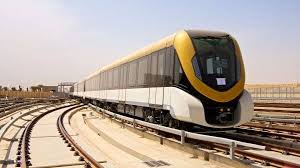Project Overview
The Riyadh Metro is a monumental infrastructure project that is set to transform the urban landscape of Riyadh, the capital city of Saudi Arabia. As one of the largest and most advanced metro systems in the world, it aims to address the growing transportation needs of the city’s rapidly expanding population. This article provides the latest updates on the Riyadh Metro, highlighting its significance, progress, challenges, and future prospects.
Background
The Riyadh Metro project was initiated as part of Saudi Arabia’s Vision 2030, a strategic framework aimed at reducing the kingdom’s dependence on oil and diversifying its economy. The metro system is designed to alleviate traffic congestion, reduce air pollution, and provide efficient public transportation options for residents and visitors alike.
Key Features
- Network Size: The Riyadh Metro will consist of six lines covering approximately 176 kilometers (109 miles) and will feature 85 stations.
- Technology: The metro will utilize state-of-the-art technology, including driverless trains, advanced signaling systems, and energy-efficient infrastructure.
- Integration: The project will integrate with other forms of public transportation, such as buses and taxis, creating a seamless transit experience for users.
Latest Developments
Construction Progress
As of late 2023, significant progress has been made in the construction of the Riyadh Metro. Key updates include:
- Completion of Major Sections: Several lines are nearing completion, with extensive work done on Line 1 (the Blue Line) and Line 2 (the Red Line). These lines are expected to be operational by the end of 2024.
- Station Developments: Many of the metro stations are in the final stages of construction. The stations are being designed to reflect Saudi Arabian culture and heritage, incorporating local architectural elements.
- Testing Operations: Testing of train systems and safety protocols has begun on certain sections, with successful trials indicating that the project is on track for its projected timelines.
Environmental and Economic Impact
The Riyadh Metro project is poised to have a significant impact on both the environment and the economy of Saudi Arabia:
- Environmental Benefits: By providing a reliable and efficient public transportation system, the Riyadh Metro is expected to reduce the number of vehicles on the road, leading to lower greenhouse gas emissions and improved air quality in the city.
- Economic Growth: The project is creating thousands of jobs during the construction phase and is expected to stimulate economic growth through increased accessibility and connectivity in the city. The metro is anticipated to attract investments and boost local businesses, particularly in areas surrounding the stations.
Challenges Faced
Despite the significant progress, the Riyadh Metro project has faced several challenges:
Delays and Budget Overruns
- Construction Delays: The scale and complexity of the project have led to delays in certain areas, primarily due to unforeseen circumstances such as supply chain disruptions and labor shortages.
- Budget Constraints: While the project is funded by the Saudi government, fluctuations in oil prices and economic conditions have raised concerns about budget overruns and the long-term financial sustainability of the project.
Public Perception and Acceptance
- Public Awareness: There has been a need for increased public awareness about the benefits of the metro system. Initiatives to educate residents about the metro’s impact on daily commuting and the environment are ongoing.
- Cultural Considerations: The integration of public transportation into the daily lives of Saudi citizens requires cultural shifts, particularly regarding the acceptance of public transport as a viable option for commuting.
Future Prospects
Timeline for Completion
The Riyadh Metro is expected to be fully operational by 2025, with phased openings beginning in late 2024. The completion of the metro system will mark a significant milestone in the city’s development and its efforts to modernize its infrastructure.
Expansion Plans
Following the initial launch of the Riyadh Metro, there are plans for future expansions to further enhance the public transportation network in Saudi Arabia. These expansions may include:
- Additional Lines: Proposals for new metro lines that connect to suburban areas and neighboring cities are being discussed to accommodate the growing population and urban sprawl.
- Integration with High-Speed Rail: Future plans may also include the integration of the Riyadh Metro with high-speed rail networks, facilitating easier travel between major cities in Saudi Arabia.
Community Engagement
Stakeholder Involvement
The success of the Riyadh Metro project hinges on active community engagement and stakeholder involvement. The government has been working closely with local communities, businesses, and organizations to ensure that the metro system meets the needs of the population.
Public Consultation
Regular public consultations have been held to gather feedback from residents about the project. These consultations aim to address concerns and incorporate suggestions into the planning and development process.
Conclusion
The Riyadh Metro represents a transformative step forward for Saudi Arabia, particularly for the city of Riyadh. As the project nears completion, it promises to revolutionize urban mobility, enhance the quality of life for residents, and contribute to the broader goals of Vision 2030. With its advanced technology, environmental benefits, and economic potential, the Riyadh Metro is set to become a cornerstone of the city’s infrastructure. As the project progresses, continued public engagement and support will be crucial in ensuring its success and acceptance within the community. The future of transportation in Riyadh looks promising, and the Riyadh Metro will play a pivotal role in shaping the city’s urban landscape for generations to come.







